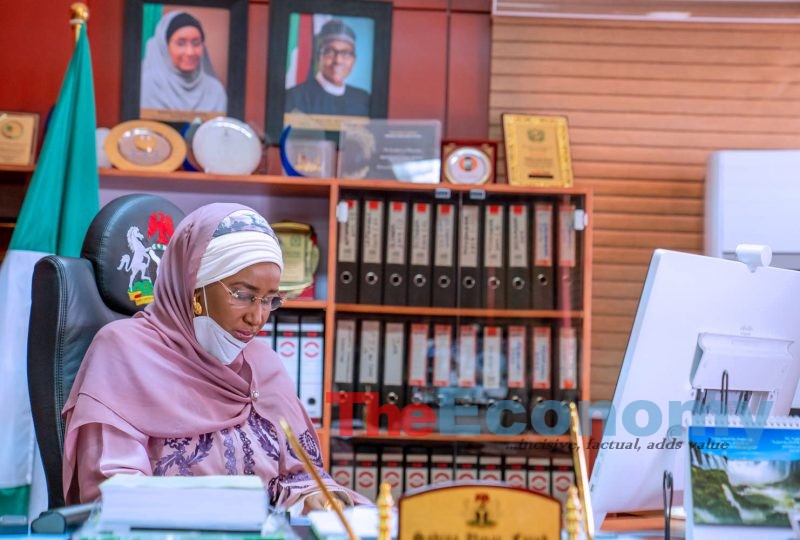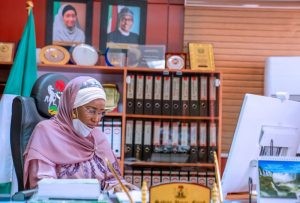About 99 per cent of the ministry’s spendings was on the social investment programmes.
Nigeria’s ministry of humanitarian affairs received N258.4 billion between January and September 2020, out of which it spent N96.3 billion of the sum within the same period.
This was contained in a document the ministry submitted to the National Assembly joint committee on poverty alleviation obtained exclusively by PREMIUM TIMES.
About 99 per cent of the total amount spent by the ministry was used for the social investment programmes (NSIP) with the ministry saying it spent about N95.2 billion on the NSIPs between January and September.
The NSIP expenditure includes N66.1 billion spent on recurrent expenditure and N29.1 billion spent on capital projects.
The NSIPs are the social investment programmes of the Buhari administration, largely aimed at poor, unemployed and disenfranchised Nigerians. The programmes include N-Power for unemployed graduates, Government Enterprise and Empowerment Programme (GEEP) for small and micro businesses, Conditional Cash Transfer to poor Nigerians and the National Home Grown School Feeding Programme for public primary school pupils.
After the revision of the 2020 budget due to the shortfall in government revenue as a result of COVID-19 and drop in oil price, a sum of N374.4 billion was appropriated for the NSIP.
This comprised N292 billion as recurrent expenditure, N50 billion as capital expenditure and N32.5 billion as COVID-19 capital spending. The latter was allocated for the provision of cash transfer to “additional 1 million poor Nigerians under the COVID-19 Intervention Fund” and to “cover the development of a Rapid Response Register (RRR) and the provision of N5,000 to target beneficiaries over a period of 12 months.”
Of the N374.4 billion approved for the social programmes, N256 billion had been released as of September, the official document showed.
While there have been releases of N219.7 billion for the capital projects and N36.4 billion for the recurrent subheads of the social programmes, “the ministry is yet to receive any release for the implementation of the COVID-19 Cash Transfer,” the document noted.
The ministry then explained why it was yet to utilise over 50 per cent of money released for NSIP capital projects.
“The utilization of the capital releases was significantly affected by the COVID-19 pandemic,” the ministry said in the document submitted to lawmakers in October. “However, the procurement process for the utilisation of the capital allocation for NSIP has reached (an) advanced stage for all projects.”
For 2021, meanwhile, the Nigerian government has proposed N400 billion for the social investment programmes, subject to the approval of the National Assembly.
This comprises recurrent propositions of N350 billion and N50 billion for capital spendings, including the N145 billion for the Home-Grown School Feeding Programme (NHGSFP).
2020 budget performance
In the revised 2020 budget, N3.125 billion was approved for humanitarian ministry’s own operations, separate for the NSIP funding. The N3.125 billion comprised a recurrent expenditure of N342.1 million and capital allocation of about N2.8 billion.
As of September, N1.2 billion had been released, the document showed, and the ministry said it had spent only about N281.6 million.
A total of N134.5 million was spent on recurrent payments, while N147.1 million went into capital expenses.
Apart from this, according to the document, about N551.4 million was allocated to the ministry as COVID-19 interventions fund, all of which has been released to the ministry since June.
Of that amount, N321.4 million has been spent, the document showed.
“It is important to note that the capital release was project specific, that is humanitarian interventions during COVID-19 pandemic,” the document read.
Non-budgetary spendings
The document further showed that another N692 million was released to the ministry this year as the second instalment of its take-off grant since its establishment in 2019.
“The amounts released were earmarked for the expenditure that would ensure smooth take-off of the ministry and its operational efficiency,” the document noted.
The ministry said it had spent about N500 million of this amount.
Furnishing and partitioning alone cost the agency N260.9 million, while ICT equipment and software gulped N127.6 million, with the ministry spending another N111.5 million on the establishment of two zonal offices.
In all, for both the ministry’s headquarters activities and the social investment programmes, in 2020, N378.8 billion was apportioned to the humanitarian ministry.
As of September, N258.4 billion of the amount has been released, while N96.3 billion of that has been spent, a review of the document revealed.
This means the ministry had about N162.1 billion left in its coffers at the time it submitted its report to the lawmakers in October.



